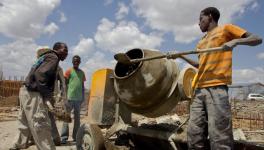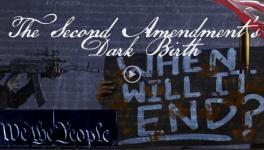Chronicle of the Unavailing Afghan War
President Joe Biden wipes his eye as he walks through Arlington National Cemetery to honor fallen veterans of Afghan war, April 14, 2021
One missing part in US President Joe Biden’s remarks on Wednesday announcing troop withdrawal from Afghanistan was that he didn’t order a commission of inquiry into the disastrous military invasion of 2001.
It’s an intriguing lapse, as Biden did acknowledge that “There are many who loudly insist that diplomacy cannot succeed without a robust U.S. military presence to stand as leverage. We gave that argument a decade. It’s never proved effective…Our diplomacy does not hinge on having boots in harm’s way.”
Truly, this was an “unavailing war.” In a survey in Washington Post, Ishaan Tharoor began by lamenting, “The initial punitive mission might have succeeded, but it turned into America’s longest war, a Sisyphen exercise in counterinsurgency and state-building.” How did that happen? [Emphasis added.]
The heart of the matter is that this was a war doomed to fail. The US invasion of Afghanistan was completely unnecessary for the stated purpose of removing Taliban from power. No Afghan party, including the UN-recognised government led by late Burhanuddin Rabbani, sought an American military intervention.
The intervention was originally in the nature of a token insertion of a couple of dozens special forces’ personnel in October 2001 into the underbelly of northern Amu Darya region to advise two Northern Alliance warlords Rashid Dostum and Mohammed Atta and finance and equip their militia. The invasion proper happened after the actual overthrow of the Taliban regime in Kabul by the Northern Alliance militia. And it took Rabbani government by surprise.
The then Foreign Minister Abdullah Abdullah vocally protested. The regional states, too, were taken by surprise. In fact, when the US aircraft with troops landed at Bagram air base, a Russian aircraft was also landing and had to be shooed away.
The Americans never really explored diplomatic options, as Biden would have thought. To recap, in the downstream of the assassination of Ahmed Shah Massoud, the Northern Alliance reached out to King Zahir Shah (living in exile in Rome) and persuaded him to come back from retirement and assume leadership.
The late king commanded immense respect not only within Afghanistan but regionally and internationally, and the Northern Alliance correctly judged that there was no better way to proceed with the removal of the Taliban regime than by constituting a government-in-exile carrying the imprimatur of Zahir Shah.
But the US only paid lip service to that idea. Washington’s focus in those fateful days after the 9/11 attacks was on the back-to-back conversation involving Islamabad and Kandahar. But even there, the US eventually lost interest to explore optimally the possibility of Pakistan persuading Mullah Omar to deport Osama bin Laden from Afghan soil.
Put simply, a military path suited the George W. Bush administration’s domestic political requirements, reeling under the shock of 9/11 attacks and embarrassed by the sheer ineptness in preventing them.
Having said that, the US also did not want to share with Russia and Iran the influence it sought with any post-Taliban political arrangement that might be required in Kabul. Washington viewed the Northern Alliance as heavily under Russian and Iranian influence. Essentially, the US wanted monopoly over the future power structure in Afghanistan with a view to eventually introduce the North Atlantic Treaty Organisation [NATO] into the region as provider of security.
The western powers had decided in advance on a geopolitical blueprint under the rubric “war on terror.” The regional states — Iran, in particular — were hoodwinked into believing that Bonn Conference (December 2001) to discuss an interim government for Afghanistan was a genuine initiative toward stabilising the Afghan situation by forming a broad-based, representative government.
Thus, when the US diplomats suddenly produced Hamid Karzai out of their hat, many protesting voices were heard. Ironically, US sought the help of Javad Zarif (Iran’s present FM) to pacify the agitated Northern Alliance delegation at the Bonn Conference.
Even Zahir Shah was not privy to the secret understanding amongst the NATO powers. Washington’s first choice to lead the interim government was not even Karzai. The Americans gave different impressions to different people.
Some, like Anatol Lieven (variously described as journalist, author or academic), were led to believe that with US backing, Mujahideen Commander Abdul Haq was the frontrunner.(Probably, that rumour cost Haq his life, as in mysterious circumstances on October 26, 2001, within a fortnight after Lieven interviewed him in Peshawar, the Taliban announced that Haq was “captured inside Afghanistan” and killed — and Pakistani intelligence “sources” promptly confirmed the news.)
Zahir Shah himself was under the impression that his favourite aide, Abdul Sattar Sirat (a cousin of Northern Alliance leader Yunus Qanooni) was the choice of the Americans. Sirat is a former justice minister and advisor to the prime minister under Zahir Shah, and a highly respected Islamic scholar trained in Cairo and Columbia University. So, the story goes, on the eve of the Bonn Conference, late in the night when Zahir Shah was woken up in Rome and asked to persuade Sirat to withdraw, he was perplexed and asked, “Who is the alternative?” And, when Karzai’s name was told to him, the old king responded in daze, “Who is that?”
To date, it remains a mystery how Karzai’s name popped up at all. Indeed, Karzai was not a patch on Sattar in formal education, erudition, statecraft or sheer political experience. Presumably, the Americans (mis)took Karzai to be a weak and malleable person who would be at their bidding. That deeply flawed calculation, more than anything else, probably cost Washington this war.
Years later, according to WikiLeaks cables, both Peter Galbraith, a former UN envoy to Afghanistan and Karl Eikenberry, a former commander of US forces in Afghanistan and ambassador in Kabul, raised questions about Karzai’s “mental stability” and drug addiction. At any rate, when the decision of the Bonn Conference was relayed to Rabbani in Kabul, he reacted bitterly that foreign powers should never again dictate the future of Afghanistan.
The bottom line is that the US had no fixed agenda in the war. It shifted already within the first few weeks from the removal of the Taliban regime to outright invasion of Afghanistan and soon thereafter to creation of a puppet regime. The nadir was reached when Bush began talking about a Marshall Plan to rebuild Afghanistan, as in Germany and Japan — that is, before Iraqis chastened him.
Meanwhile, the occupation of Afghanistan became an end in itself, with war profiteering turning into a roaring business with money, women, drug trafficking, foreign bank accounts, contractors — all thrown into it, spawning mind-boggling corruption and venality and creating a dysfunctional Afghan state. That’s how, quintessentially, Afghanistan became a low hanging fruit for the Taliban to pluck in their second coming.
Now, as the defeated Islamic State and al-Qaeda fighters from Syria got relocated to Afghanistan in recent years, a new agenda is struggling to be born — jihad in Xinjiang, Central Asia and North Caucasus. That unspoken agenda would have required the “forever war” to remain open-ended.
Clausewitz once wrote: “No one starts a war — or rather, no one in his senses ought to do so — without first being clear in his mind what he intends to achieve by that war and how he intends to conduct it.” But he added a caveat that the theoretical concept is not borne out in practice because of a “vast array of factors, forces, and conditions in national affairs that are affected by war.” How true!
Biden owes it to the more than 2,300 US soldiers who lie in the Arlington Cemetery to get to the bottom of it — how a limited punitive mission by two dozen special forces’ personnel morphed into a Sisyphean exercise that lasted nineteen years.
Courtesy: Indian Punchline
Get the latest reports & analysis with people's perspective on Protests, movements & deep analytical videos, discussions of the current affairs in your Telegram app. Subscribe to NewsClick's Telegram channel & get Real-Time updates on stories, as they get published on our website.
























